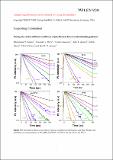Tuning the exciton diffusion coefficient of polyfluorene based semiconducting polymers
Abstract
Exciton diffusion plays an important role in functional materials used in organic optoelectronic devices, such as solar cells, organic light emitting diodes, and lasers. Here we explore how exciton diffusion can be controlled in highly fluorescent blue‐emitting polyfluorene materials by changing the length and type of side chains. We find that the exciton diffusion coefficient (D) decreases from 1.2 × 10−3 cm2 s−1 to 0.2×10−3 cm2 s−1 when the side chain length is increased from 8 to 12 carbon atoms. Other changes to the side chains led to enhancement of D up to 1.6 × 10−3 cm2 s−1. Our results show that small adjustments to the molecular structure can be helpful for the future development of high‐brightness organic light emitting devices.
Citation
Sajjad , M T , Ward , A J , Ruseckas , A , Bansal , A K , Allard , S , Scherf , U & Samuel , I D W 2018 , ' Tuning the exciton diffusion coefficient of polyfluorene based semiconducting polymers ' , Physica Status Solidi - Rapid Research Letters , vol. Early View , 1800500 . https://doi.org/10.1002/pssr.201800500
Publication
Physica Status Solidi - Rapid Research Letters
Status
Peer reviewed
ISSN
1862-6254Type
Journal article
Description
The authors acknowledge financial support from FP7 project “Laser Induced Synthesis of Polymeric Nanocomposite Materials and Development of Micro‐patterned Hybrid Light Emitting Diodes (LED) and Transistors (LET)” – LAMP project (G.A. 247928). M.T.S., A.R., and I.D.W.S. acknowledge support from the European Research Council (EXCITON grant 321305). I.D.W.S. acknowledges a Royal Society Wolfson Research Merit Award. The authors are grateful to EPSRC for an equipment grant (EP/L017008/1).Collections
Items in the St Andrews Research Repository are protected by copyright, with all rights reserved, unless otherwise indicated.

